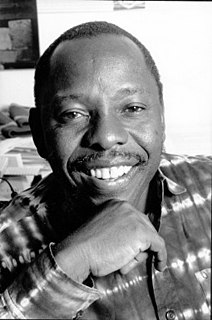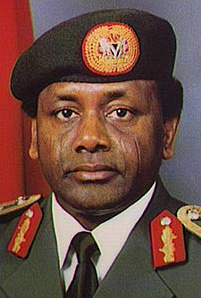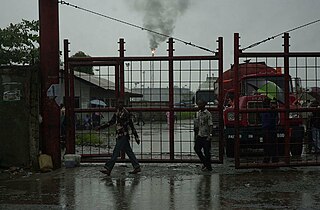Related Research Articles

Kenule Beeson "Ken" Saro-Wiwa was a Nigerian writer, television producer, environmental activist, and winner of the Right Livelihood Award for "exemplary courage in striving non-violently for civil, economic and environmental rights" and the Goldman Environmental Prize. Saro-Wiwa was a member of the Ogoni people, an ethnic minority in Nigeria whose homeland, Ogoniland, in the Niger Delta has been targeted for crude oil extraction since the 1950s and which has suffered extreme environmental damage from decades of indiscriminate petroleum waste dumping. Initially as spokesperson, and then as president, of the Movement for the Survival of the Ogoni People (MOSOP), Saro-Wiwa led a nonviolent campaign against environmental degradation of the land and waters of Ogoniland by the operations of the multinational petroleum industry, especially the Royal Dutch Shell company. He was also an outspoken critic of the Nigerian government, which he viewed as reluctant to enforce environmental regulations on the foreign petroleum companies operating in the area.

Sani Abacha GCFR was a Nigerian military general who served as the military head of state of Nigeria from 1993 until his death in 1998. He was also Chief of Army Staff between 1985 to 1990; Chief of Defence Staff between 1990 to 1993; and Minister of Defence. In 1993, Abacha became the first Nigerian soldier to attain the rank of a full military general without skipping a single rank.
The Ogoni Nine were a group of nine activists from the Ogoni region of Nigeria who opposed the operating practices of the Royal Dutch Shell oil corporation. Their members included outspoken author and playwright Ken Saro-Wiwa, Saturday Dobee, Nordu Eawo, Daniel Gbooko, Paul Levera, Felix Nuate, Baribor Bera, Barinem Kiobel, and John Kpuine, who were executed by hanging in 1995 by the military dictatorship of General Sani Abacha and buried in Port Harcourt Cemetery.
The Movement for the Survival of the Ogoni People, also known as (MOSOP), is a mass‐based social movement organization of the indigenous Ogoni people of Central Niger Delta. MOSOP is the umbrella organization of currently 11 member groups representing more than 700,000 indigenous Ogoni in campaigning for social, economic and environmental justice in the Niger Delta of Nigeria. MOSOP's mandated use of non-violent methods to promote democratic principles assist Ogoni people pursue rights of self-determination in environmental issues in the Niger Delta, cultural rights and practices for Ogoni people.

The Niger Delta is the delta of the Niger River sitting directly on the Gulf of Guinea on the Atlantic Ocean in Nigeria. It is typically considered to be located within nine coastal southern Nigerian states, which include: all six states from the South South geopolitical zone, one state (Ondo) from South West geopolitical zone and two states from South East geopolitical zone. Of all the states that the region covers, only Cross River is not an oil-producing state.

The Ogoni people are people in the region of Southeastern Senatorial district in Rivers State Nigeria. They now number about over two million people and live in a 1,050-square-kilometre (404-square-mile) homeland which they also refer to as Ogoni, or Ogoniland. They share common oil-related environmental problems with the Ijaw people of Niger Delta.

Nigeria is the largest oil and gas producer in Africa. Crude oil from the Niger delta basin comes in two types: light, and comparatively heavy – the lighter around 36 gravity and the heavier, 20–25 gravity. Both types are paraffinic and low in sulfur.
Shell Nigeria is the common name for Royal Dutch Shell's Nigerian operations carried out through four subsidiaries—primarily Shell Petroleum Development Company of Nigeria Limited (SPDC). Royal Dutch Shell's joint ventures account for more than 21% of Nigeria's total petroleum production(629,000 barrels per day in 2009) from more than eighty fields.

The current conflict in the Niger Delta first arose in the early 1990s over tensions between foreign oil corporations and a number of the Niger Delta's minority ethnic groups who feel they are being exploited, particularly the Ogoni and the Ijaw. Ethnic and political unrest continued throughout the 1990s despite the return to democracy and the election of the Obasanjo government in 1999. Struggle for oil wealth has fueled violence between ethnic groups, causing the militarization of nearly the entire region by ethnic militia groups, Nigerian military and police forces, notably the Nigerian Mobile Police. The violence has contributed to Nigeria's ongoing energy supply crisis by discouraging foreign investment in new power generation plants in the region.
The key environmental issues in the Niger Delta of Nigeria relate to its petroleum and industry.

Monday Owens Wiwa is a medical doctor and human rights activist. He is the brother of executed Ogoni leader Ken Saro-Wiwa, and the son of Ogoni chief Jim Wiwa. Wiwa is an internationally renowned expert on the effects of globalisation, especially as it relates to the highly controversial business practices of Royal Dutch Shell in the Niger Delta. Vice-chairman of the Toronto chapter of the Sierra Club Canada and an active member of Amnesty International, Wiwa is frequently called upon to advocate for development programs in Canada and abroad and to campaign for increased corporate responsibility. This work has taken him to Ireland, which he visits in support of the Shell to Sea campaign. Currently, he is the Global Vice President Human Resource for Health, Director for West Africa and Central Africa and Country Director, Nigeria for Clinton Health Access Initiative.

The Politics of Bones: Dr. Owens Wiwa and the Struggle for Nigeria's Oil is a book by Canadian journalist J. Timothy Hunt. It was published by McClelland & Stewart in September 2005 just before the tenth anniversary of the controversial execution of Ken Saro-Wiwa.

Bori is a city in Khana Local Government Area, Rivers State, southern Nigeria. It is the birthplace of author and activist Ken Saro-Wiwa.
Major Isaac Jasper Adaka Boro, fondly called "Boro", was a Nigerian nationalist, Ijaw, and soldier. He was one of the pioneers of minority rights activism in Nigeria.
The Wiwa family lawsuits against Royal Dutch Shell were three separate lawsuits brought by the family of Ken Saro-Wiwa against Royal Dutch Shell, its subsidiary Shell Nigeria and the subsidiary's CEO Brian Anderson, in the United States District Court for the Southern District of New York under the Alien Tort Statute, the Torture Victim Protection Act of 1992 and Racketeer Influenced and Corrupt Organizations Act (RICO). They were charged with complicity in human rights abuses against the Ogoni people in the Niger Delta, including summary execution, crimes against humanity, torture, inhumane treatment, arbitrary arrest, wrongful death, and assault and battery. The lawsuits were filed by the Center for Constitutional Rights (CCR) and co-counsel from EarthRights International in 1996, and after 12 years of Shell petitioning the court not to hear the cases, they were heard 26 May 2009.
Judith Brown Chomsky is an American human rights lawyer. She was born in Philadelphia, Pennsylvania in 1942, and is the sister-in-law of MIT professor Noam Chomsky. She became involved with politics when she participated in demonstrations in the 1950s for the right of African-Americans to use non-segregated lunch counters.
There have been a large number of successful and failed military coups in Nigeria since the country's independence in 1960. A military coup is the violent or non-violent overthrow of an existing political regime by the military. Between 1966 and 1999 the army held power in Nigeria without interruption apart from a short-lived return to democracy between 1979 to 1983.
Six awards were awarded in the categories: National Print; Periodicals; Photojournalism; Radio; Television Documentary; and Television News.
Ogoni/Niger Delta News is a news website that publishes daily news about Ogoniland, the Niger Delta, Rivers state, Nigeria and the world at large. Most of its news is taken from sources such as Vanguard, the Leadership, newspaper and the DailyPost Nigeria.

Ogoni nationalism is a political ideology that seeks self determination by the Ogoni people. The Ogonis are one of the many indigenous peoples in the region of southeast Nigeria. They number about 1.5 million people and live in a 404-square-mile (1,050 km2) homeland which they also refer to as Ogoni, or Ogoniland. They share common oil-related environmental problems with the Ijaw people of Niger Delta.
References
- 1 2 "Nigeria States". WorldStatesmen. Retrieved 2010-04-01.
- ↑ "BACKGROUND MATERIAL ON OGONI". Unrepresented Nations and Peoples Organisation. June 1994. Retrieved 2010-04-01.
- ↑ "Nigeria: Ogoni Land after Shell" (PDF). International Crisis Group. 18 September 2008. Retrieved 2010-04-01.
- ↑ Ike Okonta, Oronto Douglas (2003). Where vultures feast: shell, human rights, and oil in the Niger Delta. Verso. p. 128ff. ISBN 1-85984-473-1.
- ↑ Lewis, Paul (February 13, 1996). "BLOOD AND OIL: A Special Report.;After Nigeria Represses, Shell Defends Its Record". New York Times. Retrieved 2010-04-01.
- ↑ "NIGERIA: Military government clampdown on opposition". Amnesty International. 11 November 1994. Archived from the original on 2009-08-11. Retrieved 2010-04-01.
- ↑ "The Ogoni Crisis: A Case-Study of Military Repression in Southeastern Nigeria". Human Rights Watch. 1 July 1995. Archived from the original on 2012-10-11. Retrieved 2010-04-01.
- ↑ "U.S. Department of State Country Report on Human Rights Practices 1996 - Nigeria". United States Department of State. 30 January 1997. Archived from the original on 2012-10-11.
- ↑ "Shell settles Nigeria deaths case". BBC News. 9 June 2009. Retrieved 2010-04-01.
- ↑ "Nigeria: HRW Letter (Excerpts)". Human Rights Watch Africa. 1996-05-23. Retrieved 2010-04-01.
- ↑ Max Siollun (April 11, 2008). "Can a Military Coup Ever Succeed Again in Nigeria?". Max Siollun. Retrieved 2010-04-01.
- ↑ Abdullahi Zuru (2001-12-19). "2003: Will Emirs Achieve Consensus Governor for Kebbi?". ThisDay. Archived from the original on 2005-04-17. Retrieved 2010-04-01.